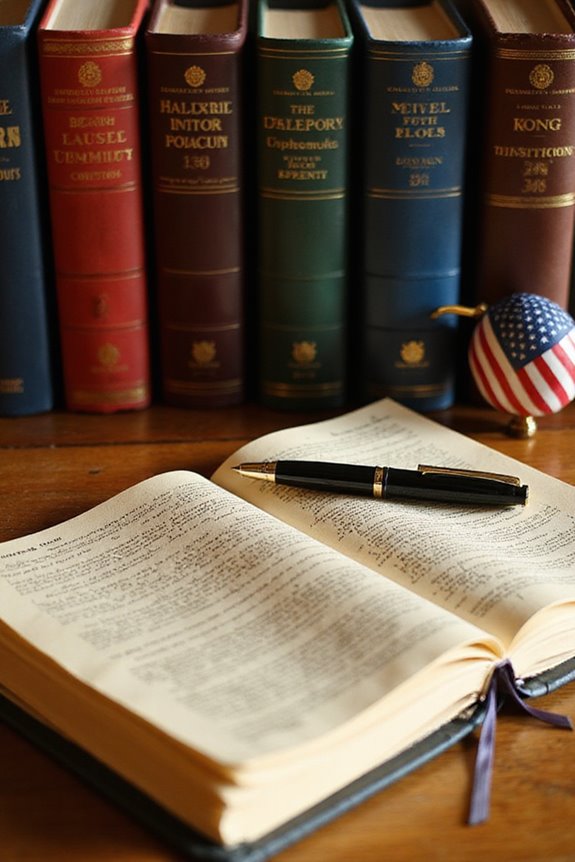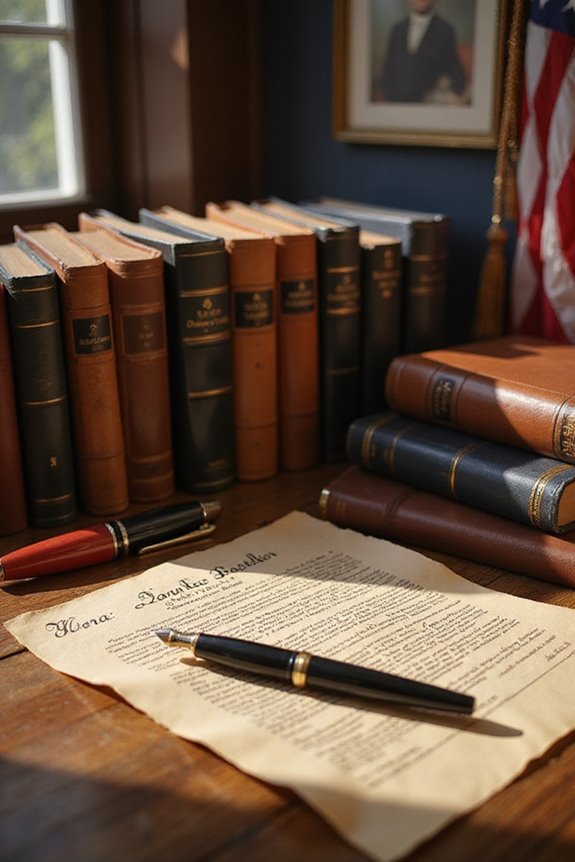To understand U.S. politics effectively, we recommend key foundational texts and analyses:
- “The Federalist Papers” by Hamilton, Madison, and Jay for constitutional insights.
- “Team of Rivals” by Doris Kearns Goodwin for leadership dynamics.
- “Believer” by David Axelrod for campaign strategy perspectives.
- “American Carnage” by Tim Alberta for contemporary political conflicts.
These resources offer thorough views on history and governance. By exploring these works, we gain clarity on political structures and ongoing challenges.
Key Takeaways
- *The Federalist Papers* provide essential insights into the Constitution’s principles and the framers’ intentions for government structure and function.
- David McCullough’s *John Adams* explores early American governance and the complexities faced by the nation’s second president.
- Doris Kearns Goodwin’s *Team of Rivals* illustrates effective leadership and collaboration within Abraham Lincoln’s cabinet during a tumultuous era.
- Dahlia Lithwick’s writings on the Supreme Court highlight the evolution of legal interpretations and their impact on American society and politics.
- Ron Chernow’s *Alexander Hamilton* delves into the founding father’s fiscal policies, shaping the financial landscape of the early United States.
Foundational Texts on U.S. Political Philosophy
Foundational texts on U.S. political philosophy provide us with essential insights into the ideas that shaped our nation. These works emerged from colonial grievances against British rule and incorporated Enlightenment principles that emphasized reason and individual rights.
Key contributions include:
- John Locke’s *Second Treatise of Government*: This text outlines natural rights and the social contract, emphasizing government by consent and the right to rebellion.
- Benjamin Franklin’s Essays: Franklin’s pragmatic governance critiques slavery and the Constitution, illustrating practical political thought.
- John Adams’ Writings: Adams offers insights into republicanism and natural rights, shaping the moral foundation of the American Revolution.
- Puritan Political Ideas: Concepts of calling, covenant, and church-state separation influenced early American political thought and constitutional development. These ideas reflect the ongoing tension between individual rights and community responsibilities in political discourse.
These texts collectively laid the groundwork for our constitutional republic. Additionally, important pamphlets from the era, such as those by lesser-known pamphleteers, contributed significantly to the discourse on independence and governance.
Government Institutions and Political Processes

Understanding the U.S. government institutions and political processes is essential for grasping how our democracy functions effectively. The federal government operates through three distinct branches: Legislative, Executive, and Judicial.
- The Legislative branch, or Congress, consists of the Senate and House of Representatives, responsible for lawmaking. A Peoples History of the United States critiques mainstream historical narratives, providing a deeper context for understanding legislative decisions.
- The Executive branch, led by the President, enforces laws with the help of federal agencies.
- The Judicial branch, including the Supreme Court, interprets laws and reviews their constitutionality.
These branches maintain a system of checks and balances. For instance, the President can veto legislation, while Congress can override that veto. This interaction guarantees that no single branch dominates, preserving democratic governance and maintaining accountability within our political system. The powers of Congress, as defined in the U.S. Constitution, include levying taxes, coining money, and regulating interstate commerce.
Political Polarization and Cultural Divides

Political polarization in the United States has reached significant levels, impacting not only political discourse but also social interactions and cultural identities.
- Cultural Identity and Partisan Loyalty: Political identities now deeply intertwine with cultural identity, influencing daily choices like consumption and social interactions. This connection often reflects core values that shape individuals’ perspectives on critical issues.
- Educational Disparities: The “diploma divide” fuels polarization, as higher education levels among liberals create cultural influence, provoking backlash from less-educated conservatives.
- Social Isolation: Increasing social isolation has led to distrust between political groups, weakening societal cohesion and trust in democratic processes. This trend is exacerbated by the decline in trust in opposing political parties, leading to further fragmentation.
- Leadership Impact: Polarizing rhetoric from leaders has framed opposing parties as adversaries, exacerbating divisions.
These factors illustrate how political polarization shapes our societal landscape, impacting both personal relationships and broader cultural dynamics. Understanding these trends is vital for maneuvering today’s political climate.
Biographies and Memoirs of Political Leaders

As we explore the landscape of U.S. politics, examining the lives of political leaders through biographies and memoirs offers valuable insights. These works illuminate various leadership styles and how they shaped political legacies. For instance, David McCullough’s *John Adams* reveals the complexities of early governance, while Ron Chernow’s *Alexander Hamilton* showcases fiscal policy challenges. Doris Kearns Goodwin’s *Team of Rivals* highlights Abraham Lincoln’s adept cabinet management during crisis. In memoirs, David Axelrod’s *Believer* provides insider perspectives on campaign strategies, and Sonia Sotomayor’s *My Beloved World* reflects on overcoming barriers. Together, these narratives deepen our understanding of political dynamics and the historical context that influences contemporary issues. Notably, Ron Chernow’s biography of Ulysses S. Grant offers a nuanced portrayal of his character that highlights his dedication to civil rights and military successes. Furthermore, these personal narratives often emphasize themes of resilience that resonate with readers seeking inspiration.
Electoral Systems and Democracy Challenges

In exploring electoral systems and the challenges they pose to democracy, we find a complex interplay between representation and governance.
- The U.S. electoral system, with its Electoral College, often creates discrepancies between popular votes and electoral outcomes.
- This winner-takes-all approach in most states can over-represent less populous areas, raising fairness concerns.
- Democracy challenges arise when voter turnout is discouraged in states perceived as safe for one party, impacting overall engagement. Voting is voluntary at federal, state, and local levels, which can further complicate participation. Understanding the importance of stable political centralization is crucial in analyzing how electoral reforms can influence democratic engagement.
- The debate around electoral reform is vital; proposals include direct popular elections, proportional allocation of electoral votes, or district-based elector systems.
- Each reform aims to enhance representation, ensuring that every vote counts equally, thereby addressing the fundamental principle of democracy.
Contemporary Political Analysis and Current Affairs
Contemporary political analysis reflects the ongoing complexities of U.S. democracy, particularly following discussions on electoral systems.
- Political Parties: Understanding their evolution is essential. From fragmented coalitions to structured entities, they’ve become mediators of social interests and identities. Political parties have also played a crucial role in the evolution of political dynamics, reshaping the landscape of American governance over time.
- Cultural Influences: Works like Katherine J. Cramer’s *The Politics of Resentment* help us grasp political resentment arising from perceived marginalization.
- Misinformation Impact: The 2025 Orwell Prize shortlist highlights how contemporary narratives are distorted, revealing the fragility of political discourse.
- Institutional Resilience: Books on safeguarding democratic institutions stress the importance of legal norms and civil society in maintaining stability.
Historical Context of American Governance
Understanding the historical context of American governance is essential for comprehending the evolution of its political landscape. Key milestones, such as the Declaration of Independence in 1776 and the Constitutional Convention in 1787, laid the groundwork for our current system.
- Revolutionary principles emphasized individual rights and limited government power, culminating in the Bill of Rights in 1791.
- The debates that surrounded the Constitution’s ratification highlighted the balance between federal authority and state sovereignty. The Articles of Confederation served as a critical reminder of the challenges that arise when a central government lacks sufficient power to govern effectively.
Through the early national period, significant challenges emerged, including the inadequacy of the Articles of Confederation. As political parties formed, they began to reflect diverse interests, shaping policy priorities. These foundational elements continue to influence our governance and democratic practices today.
Recommendations From Political Experts and Scholars
As we explore the recommendations from political experts and scholars, it’s clear that their insights are invaluable for anyone looking to deepen their understanding of U.S. politics.
- Political Biographies: William Cooper suggests biographies that reveal leadership traits and political narratives, providing context on decision-making within American governance. Notable figures like Jimmy Carter and Richard Nixon have had their presidencies thoroughly examined through various biographies, offering lessons from their successes and failures.
- Trump Era Analysis: Tim Alberta’s *American Carnage* and *The Divider* by Baker and Glasser explore internal party conflicts and the implications of Trump’s presidency.
- Institutional Foundations: Jack Rakove’s recommendations on the U.S. Constitution and Dahlia Lithwick’s works on the Supreme Court illustrate the evolution of legal frameworks and institutional power.
These texts serve as essential resources for grasping the complexities of American political dynamics and the factors influencing leadership styles.
Frequently Asked Questions
What Books Focus on Grassroots Movements in U.S. Politics?
Did you know that grassroots movements accounted for nearly 70% of successful social reforms in the last decade? We recommend exploring books like *Rules For Radicals* and *Prisms of the People* for effective community organizing and activist strategies.
How Do Political Ideologies Influence Voter Behavior?
Political ideologies shape voter psychology along the ideological spectrum, influencing our perceptions and decisions. They guide us in aligning with candidates and parties, ultimately impacting how we engage in the electoral process together.
Are There Books on Women in U.S. Political History?
Yes, there’re several insightful books on women in U.S. political history, covering topics like women’s suffrage and feminist politics. These works beautifully illustrate the diverse roles women have played in shaping our political landscape.
What Literature Discusses the Impact of Social Media on Politics?
Imagine a protest organized through Twitter, where digital activism mobilizes thousands. We can explore literature detailing social media influence on politics, like “Breaking the Social Media Prism,” which examines how online platforms shape public discourse and engagement.
Which Books Cover the Role of Money in American Elections?
We’re keen on exploring books that investigate campaign finance and its impact on election integrity. Understanding these dynamics helps us grasp how money shapes political landscapes, influencing both candidates and voter perceptions in significant ways.







